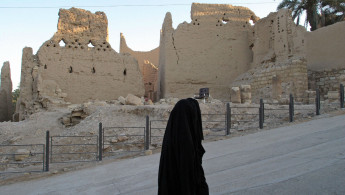The young Saudis who are guided by the sword
On 3 November, the day of Ashura, eight Shia Muslims were shot dead as they left a mosque in Saudi Arabia’s al-Ahsa province. A few weeks later, a Danish citizen working in the capital Riyadh was injured when gunmen opened fire on his car.
This followed two separate attacks on foreigners in the kingdom over the past two months.
A worrying pattern is emerging in Saudi Arabia. Authorities are beginning to connect these events to the Islamic State group (IS, formerly known as ISIS). The ministry of interior linked the attack on the Shia Muslims to IS sympathisers. Thirty-two suspects were arrested in connection to the murders.
Today, a video was posted on an extremist website, where members of an Islamic State cell claimed responsibility for the attack on the Danish man. Meanwhile, thousands of young Saudis have smuggled themselves into Syria and Iraq to fight in the ranks of the IS group. Saudis make up the second largest contingent of foreign fighters in the organisation, accccording to estimates.
Call from the "caliph"
Although it is unlikely that these attacks were directed from the den of IS chief Abu Bakr al-Baghdadi in Mosul, it would appear that the extremist ideology of the group inspired the assailants.
On 13 November, in a speech released by the Islamic State group, the self-proclaimed "caliph of the Muslims" called on his followers to attack Westerners, Shia Muslims and the Saud family.
The Islamic State group are currently fighting moderate rebels and Kurdish Peshmerga in Syria as well as Sunni tribes in Iraq. The extremists are also at war with the Shia-led Iraqi government and its allied militias, along with the Syrian regime.
Meanwhile, IS fighters are under attack from the air by a US-led coalition, which includes Saudi Arabia and other Gulf states.
In effect, the IS are at war with those that hardline Wahhabis in Saudi Arabia view as "heretical" or "apostate".
An extremist past
Earlier in the year, an opinion poll in Saudi Arabia gave pause for thought. The poll found that 92 percent of respondents believed the IS group complied with the values of Islam and Sharia law. A majority of those who said that "the Islamic State group is not extreme" were aged between 25 and 30.
Abdul Rahman al-Mushawwah, leader of al-Sakine, a state-run campaign to counter extremism in Saudi Arabia, dismissed the poll as "inaccurate, exaggerated and unscientific". Al-Sakina, which is connected to the ministry of Islamic affairs, says the reality on the ground in Saudi Arabia contradicts the poll’s results and has commissioned an alternative study to find the "true" level of support for the IS group in the kingdom.
Although Saudi Arabia's Wahhabi experiences have undoubtedly helped shape the radical views of takfiri groups in the region, militancy in the kingdom only really exploded after the 1991 Gulf War. With the threat of Saddam Hussein's Iraqi army overrunning Saudi Arabia, the country's rulers "invited" the United States to deploy troops in the kingdom.
As the land of the two holiest sites in Islam, and the birthplace of the Prophet Mohammad, many Saudis believed that the decision was blasphemous.
Bombings, beheadings and assassinations shook the country’s expatriate community, as groups linked to al-Qaeda launched terror attacks on foreigners throughout the 1990s and 2000s. When Riyadh finally took a stand against the extremists, once state property and security forces were targeted, hundreds of suspected terrorists were hauled into custody while efforst were made to block funding of terror groups. Many radicals went to jail, others were killed in raids, while still others fled to fight in Iraq and Afghanistan.
Rebranding terror
At the start of 2009, two al-Qaeda branches in Saudi Arabia and Yemen merged to form al-Qaeda in the Arabian Peninsula, AQAP.
Amalgamating the two groups did have its benefits. It cut costs, and recruits could be trained in the lawless territories of Yemen to return home to fight other Gulf regimes. This culminated in the attempted assassination of Mohammed bin Nayef, Saudi Arabia’s minister of interior.
However, many analysts also saw the merger as a sign the organisation was losing its power and prestige in the Gulf.
| According to one poll, 92 percent of Saudi respondents believe that the IS group complies with the values of Islam |
Today, al-Qaeda has lost much of its support in Saudi Arabia to the Islamic State group. Due to the sectarian nature of the fighting in Iraq and Syria, the IS group’s non-conciliatory nature, and rapid success, has inspired a new generation of Saudis. For many more, the IS group is seen as protecting Syria and Iraq's Sunni populations from government atrocities.
The IS group portrays itself as a sectarian group for a sectarian age, saying that the time for national consensus is over.
Fundamentalist Muslims in Saudi Arabia's arid and unforgiving Najd region find this rhetoric appealing. Mohamed bin Abdul Wahhab, the founder of Wahhabism, is held up as a national hero in the country, his life and teachings still part of the curriculum of schools and universities.
For those Saudis who take inspiration from his "rule by the sword", Abu Bakr’s merciless approach to dissent and his opponents fits with their vision of a how a leader should govern. Al-Qaeda on the other hand, are viewed as conservative and weak in comparison, and their influence in the Arabian Peninsula is waning.
Yet, if the Islamic State group replicates the methods of al-Qaeda, making Saudi Arabia a target of bombings, then Baghdadi's group, too, could lose support. It seems that many Saudis have sympathy with the Islamic State group, so long as they limit their activities to distant lands.
This article is an edited translation from our Arabic edition.
Opinions expressed in this article remain those of the author and do not necessarily reflect the opinions of al-Araby al-Jadeed, its editorial board or staff.



